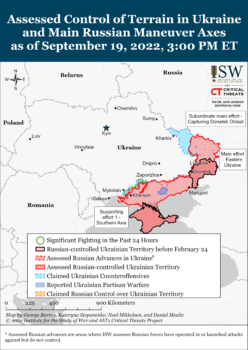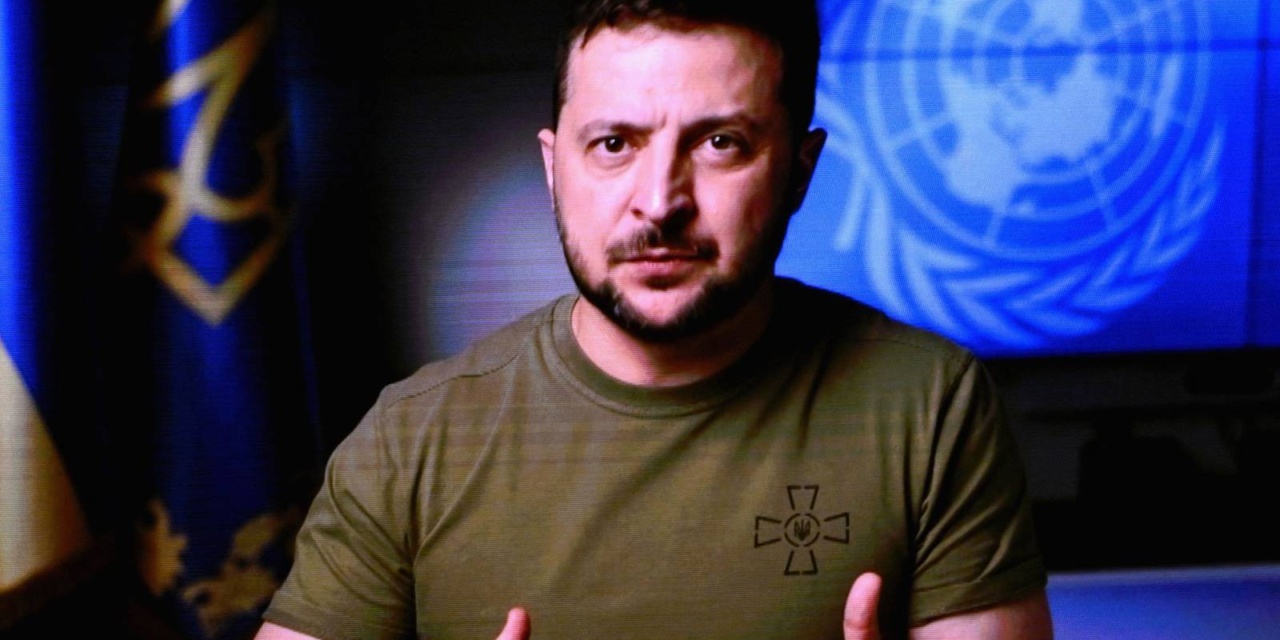Jump to Original Entry

Source: Institute for the Study of War
UPDATE 1324 GMT:
The Novaya Gazeta site, citing a Russian official, says the Russian Defense Ministry could call up 1 million people under Vladimir Putin’s “partial mobilization”.
Defense Minister Sergey Shoygu said Wednesday that 300,000 reservists would be summoned.
Kremlin spokesman Dmitry Peskov denied the Novaya Gazeta story, “This is a lie.”
But the seventh paragraph in Putin’s decree is redacted and marked “for official use”. Peskov said he cannot disclose its content, but confirmed that it is about the number of reservists.
Andrew Roth of The Guardian tweets:
Just spoke with a woman from a small village of 450 people in Buryatia. She said that local authorities tried to hand out 20 draft notices, including to several in their 50s. Even if many turned away, would still produce far more than 300k conscripts if repeated across Russia. https://t.co/s8wWbQoPk7
— Andrew Roth (@Andrew__Roth) September 22, 2022
A video from southwestern Russia shows resistance:
Pretty powerful video. In Dagestan locals clearly don't want to go to war with Ukraine. The recruiting officer argues they have to fight for the future. – We don't even have a present, what future are you talking about," replies a Dagestani man. pic.twitter.com/1O4ob2GhSN
— Tadeusz Giczan (@TadeuszGiczan) September 22, 2022
UPDATE 1135 GMT:
The UK Foreign Office Moscow tonight. Some European countries are advocating an EU ban on tourist visas that would have been his quickest route to safety. pic.twitter.com/drGDS2a4eO — Ben Judah (@b_judah) September 22, 2022 The latest Russian attacks across the Donetsk region in eastern Ukraine have killed five civilians and injured 12. Governor Pavlo Kyrolenko said two people were slain in Kurakhove and one each in Bakhmut, Avdiivka, and Karlivka. The US-based Institute for the Study of War says Vladimir Putin’s order for partial mobilization, with the call-up of 300,000 Russian reservists, will have little effect on the battlefield this year. Putin’s order to mobilize part of Russia’s “trained” reserve, that is, individuals who have completed their mandatory conscript service, will not generate significant usable Russian combat power for months. It may suffice to sustain the current levels of Russian military manpower in 2023 by offsetting Russian casualties, although even that is not yet clear…. Russia’s partial mobilization will thus not deprive Ukraine of the opportunity to liberate more of its occupied territory into and through the winter. The ISW explains the limitations of the personnel being called up: Russian reserves are poorly trained to begin with and receive no refresher training once their conscription period is completed. Russian mandatory military service is only one year, which gives conscripts little time to learn how to be soldiers. The absence of refresher training after that initial period accelerates the degradation of learned soldier skills over time. UK military intelligence adds in its latest assessment: Russia is likely to struggle with the logistical and administrative challenges of even mustering the 300,000 personnel. It will probably attempt to stand up new formations with many of these troops, which are unlikely to be combat effective for months. Even this limited mobilisation is likely to be highly unpopular with parts of the Russian population. Putin is accepting considerable political risk in the hope of generating much needed combat power. The move is effectively an admission that Russia has exhausted its supply of willing volunteers to fight in Ukraine. The head of the International Atomic Energy Agency, Rafael Grossi, has met the Ukrainian and Russian Foreign Ministers in an attempt to establish a safety and security zone around the Russian-occupied Zaporizhzhia nuclear plant in southern Ukraine. Grossi said that after discussions with Ukraine’s Dmytro Kuleba and Russia’s Sergey Lavrov, work has already begun on establishing and shaping the zone. The mere fact that the two foreign ministers are sitting down with me and are listening to our ideas, I think it’s a good indicator that there is a very strong solid base for this thing to happen. Russia has repeatedly rejected the calls of the UN and IAEA to demilitarize the Zaporizhzhia complex, the largest in Europe with six reactors, and to withdraw forces. The Russians use the position to shell Ukrainian-held territory across the Dnipro River. On Wednesday, Russian attacks damaged infrastructure objects and residential buildings. One person was killed in Nikopol and one in Zaporizhzhia. Russian security forces detained 1,311 protesters on Wednesday, following Vladimir Putin’s speech on “partial mobilization” and annexation “referenda” in Russian-occupied areas of Ukraine. The OVD-Info protest monitoring group reported demonstrations in 38 Russian cities. At least 502 people were arrested in Moscow and 524 in St Petersburg. The Moscow prosecutor’s office said organizing or participating in protests could lead to up to 15 years in prison. Interior ministry official Irina Volk said: In a number of regions, there were attempts to stage unauthorised actions which brought together an extremely small number of participants. These were all stopped. And those persons who violated laws were detained and taken to police stations for investigation and establish their responsibility. A local recruiting office in Nizhny Novgorod was reportedly hit with a Molotov cocktail, starting a small fire. A larger blaze broke out at a local administration building in Tolyatti, 1,000 km (620 miles) east of Moscow. In prisoner exchanges announced on Wednesday, 215 Ukrainian troops and 10 foreign nationals have been released by Russia. In return, Russia has received 55 prisoners including Viktor Medvedchuk, the Ukrainian politician whom Vladimir Putin allegedly wanted to install as “President” after the occupation of Kyiv and the toppling of the Zelenskiy Government. The freed troops include fighters who led the 12-week defense of Mariupol in southern Ukraine, including the Azovstal steelworks, before the port city was overrun by Russian forces in late May. The foreign nationals including five Britons and two Americans. Two of the Britons were named as Aiden Aslin and Sean Pinner, who were sentenced to death by Russian proxy officials in the Donetsk region in June. Moroccan Brahim Saadoun, condemned to death in the same trial, was also freed. The Americans are Alexander Drueke and Andy Tai Huynh, veterans from Alabama who had volunteered to fight. Other foreign nationals who have been held by the Russian proxies in Donetsk are Britons John Harding, Andrew Hill, and Dylan Healy; Croatian Vjekoslav Prebeg; and Swede Mathias Gustafsson. Medvedchuk, a long-time Putin ally, was captured by Ukrainian special forces in April and charged with high treason. The Kremlin initially rejected Ukraine President Volodymyr Zelenskiy’s offer of talks for his release, but took up the proposal after the surrender of Ukrainian troops in Mariupol. See also Ukraine War, Day 88: Russia — We May Swap Mariupol POWs for Putin Ally Medvedchuk Ukraine President Volodymyr Zelenskiy devoted his nightly address to the exchange: Today we have 215 pieces of good news. 215! This is clearly a victory for our state, for our entire society. And most importantly, for 215 families who will be able to see their loved ones in safety. Zelenskiy said five Ukrainian military commanders, including leaders of the defense of Azovstal, are now in Turkey in an operation agreed with Turkish President Recep Tayyip Erdoğan. The released prisoners will remain in Turkey “in total security and in comfortable conditions” until the end of the war, Zelenskiy said.UPDATE 0942 GMT:
UPDATE 0752 GMT:
UPDATE 0744 GMT:
UPDATE 0707 GMT:
UPDATE 0628 GMT:
ORIGINAL ENTRY: Addressing the UN General Assembly by video link on Wednesday, Ukraine President Volodymyr Zelenskiy has set out a five-point “formula for peace”.
Zelenskiy called for:
- Punishment, including sanctions and the removal of veto rights, for crimes of aggression — “So long as the aggressor is a party to decision-making in the international organizations, he must be isolated from them.”
- Protection of life;
- Restoration of security and territorial integrity;
- Security and safety guarantees;
- Support of Ukraine’s self-defense against Russian aggression.
The President cited Russia’s war crimes during its seven-month invasion, including mass graves of slain and tortured civilians from Bucha near Kyiv to Izyum in eastern Ukraine.He said Russia’s targeting of nuclear facilities would affect “all of you…because none of you will find a vaccine against radiation sickness”.
Calling for a “war for life”, Zelenskiy said a special tribunal should ensure “punishment for the crime of aggression, punishment for the violation of borders and territorial integrity”.
The President noted that Vladimir Putin was entrenched against a negotiated resolution of his invasion, citing Putin’s address earlier in the day that announced “partial mobilization” and annexation “referenda” in Russian-occupied parts of eastern and Ukraine:
Ukraine wants peace. Europe wants peace. The world wants peace. And we have seen who is the only one who wants war. There is only one entity among all UN member states who would say now if he could interrupt my speech that he is happy with this war, with his war….
Probably you have heard different words from Russia about the talks, as if they were ready for them… They talk about the talks but announce military mobilization. They talk about the talks but announce psuedo-referenda.
He said Ukraine is prepared for peace talks but only for “true, honest, fair peace”.
UN members responded with a standing ovation.

